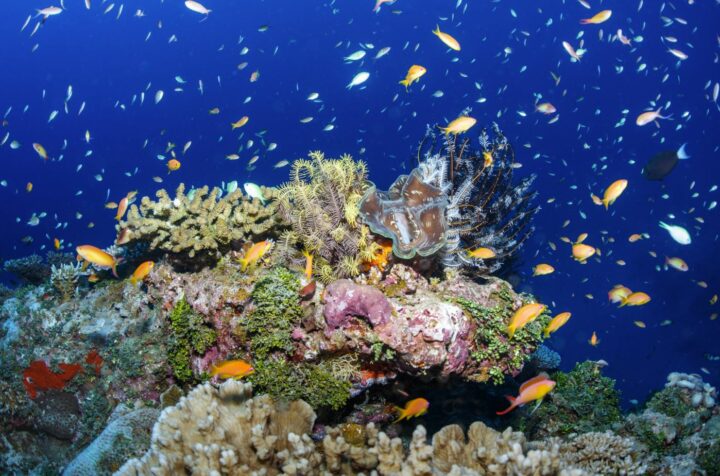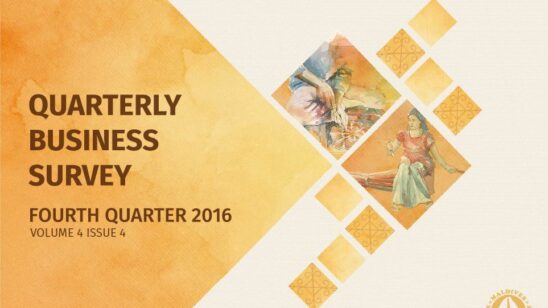
Six Senses Laamu shortlisted for the 2017 Ocean Awards
[vc_row][vc_column][vc_column_text]Six Senses Laamu is surrounded by the infinite blue waters of the Indian Ocean and every day the resort is committed to making the operation more sustainable while simultaneously raising awareness, to guests and hosts alike, about the importance of marine conservation.
The underwater world and the reefs surrounding Six Senses Laamu has had a busy and exciting 2016. The good and hard work of the team has not gone unnoticed and they were honored to have been the only hotel in the world to make the shortlist for the 2017 Ocean Awards, the preeminent prizes for marine-conservation initiatives administered by Boat International and the Blue Marine Foundation.
Staying true to the commitment of protecting the marine life of the Laamu Atoll, Marine Biologists Jenni Choma and Oscar Ignetik have started new projects on turtle identification and coral health and recovery.
In July 2016, Jenni and Oscar began identifying the Laamu turtle population. A mere six months later, the database currently stands at 138 unique individuals: 67 Hawksbill and 71 Green turtles. Each turtle can be recognized as an individual via photo identification as the pattern of scutes on their face is unique.
The sightings database created will allow the Resident Marine Biology Team at Six Senses Laamu to estimate the total populations of both Green and Hawksbill turtles in Laamu and to better understand the movements and behaviors of these species. To ensure the identification process and the interaction with turtles does not have a negative impact on their environment, behavior and movements, the Resident Marine Biology Team has created the Six Senses Laamu turtle code of conduct.
Having been trend setters in the Maldives with the creation of the first code of conduct in for Dolphin Watching, the team is hopeful that the turtle code of conduct will also become widely adopted in the Maldives ensuring that every encounter is a positive interaction and does not negatively impact the turtles, their movements and their environment.
In addition to this project, the Resident Marine Biology Team at Six Senses Laamu has created a detailed coral reef survey to monitor the recovery rates post the El Niño bleaching event in 2016. This will allow the team to evaluate both short- and long-term ecological impacts on the entire reef ecosystem and the data will be used to ensure more bleaching resistant species are planted on the artificial reefs and in the coral nursery in the future.
Six Senses Laamu continues to support the research of Manta Trust and this relationship continues to grow from strength to strength. One of the highlight of the partnership in 2016 was another first in the Maldives; a six-week intense study conducted with Dr. Mark Deakos, founder of HAMER (Hawaii Association of Marine Education and Research) in which nearly half of the resident population of 117 manta rays were accurately sized via paired laser photogrammetry. The technique, never before used in the Maldives, is highly championed for its non-invasive nature and is highly accurate for measuring wild free ranging manta rays effectively. The project results were submitted to International Union for Conservation of Nature (IUCN ) and were accepted for presentation at the country’s first ever Marine Symposium in October 2016.
Six Senses Laamu has also partnered with Blue Marine Foundation (BMF), a charity organization dedicated to creating marine reserves and establishing sustainable models of fishing. In the Laamu Atoll, the focus is on the grouper fishery as the populations of groupers throughout the Maldives are suffering from mismanagement and overfishing. Two members of BMF and the Marine Research Center team are on site gathering baseline data on the grouper fishery within the Laamu Atoll and studying grouper spawning aggregations. The team will be the first to identify length-maturity relationships of grouper species within the Maldives, which will then be used to inform policy makers of sustainable catch size limits. They are also fostering local support for sustainable fishing and conservation through an educational and environmental awareness (EEA) program.
Jenni and Oscar have also begun a dolphin sightings database to see patterns in their movements, understand the local population better, and in the long term try to identify individuals and family pods.[/vc_column_text][/vc_column][/vc_row]






